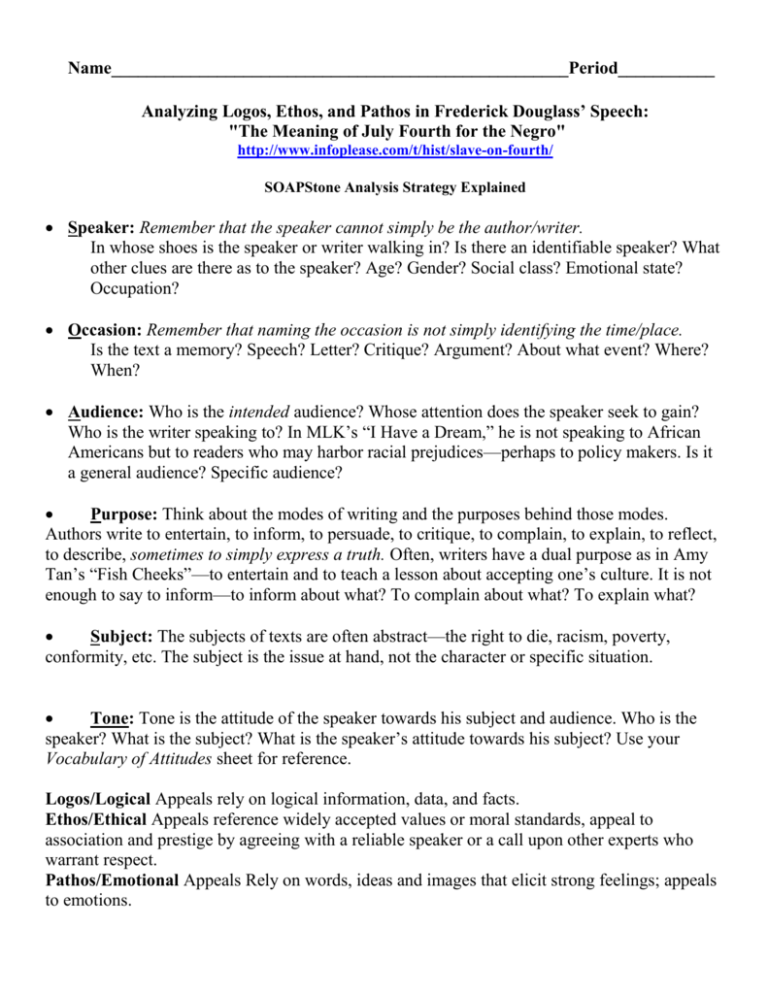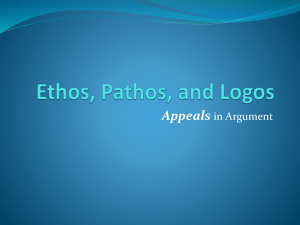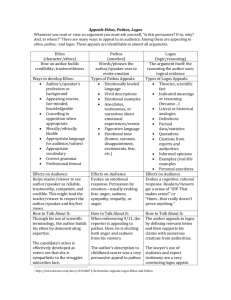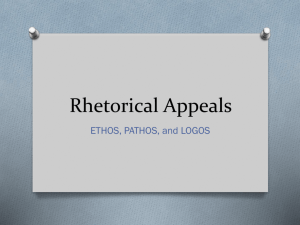student handout
advertisement

Name____________________________________________________Period___________ Analyzing Logos, Ethos, and Pathos in Frederick Douglass’ Speech: "The Meaning of July Fourth for the Negro" http://www.infoplease.com/t/hist/slave-on-fourth/ SOAPStone Analysis Strategy Explained Speaker: Remember that the speaker cannot simply be the author/writer. In whose shoes is the speaker or writer walking in? Is there an identifiable speaker? What other clues are there as to the speaker? Age? Gender? Social class? Emotional state? Occupation? Occasion: Remember that naming the occasion is not simply identifying the time/place. Is the text a memory? Speech? Letter? Critique? Argument? About what event? Where? When? Audience: Who is the intended audience? Whose attention does the speaker seek to gain? Who is the writer speaking to? In MLK’s “I Have a Dream,” he is not speaking to African Americans but to readers who may harbor racial prejudices—perhaps to policy makers. Is it a general audience? Specific audience? Purpose: Think about the modes of writing and the purposes behind those modes. Authors write to entertain, to inform, to persuade, to critique, to complain, to explain, to reflect, to describe, sometimes to simply express a truth. Often, writers have a dual purpose as in Amy Tan’s “Fish Cheeks”—to entertain and to teach a lesson about accepting one’s culture. It is not enough to say to inform—to inform about what? To complain about what? To explain what? Subject: The subjects of texts are often abstract—the right to die, racism, poverty, conformity, etc. The subject is the issue at hand, not the character or specific situation. Tone: Tone is the attitude of the speaker towards his subject and audience. Who is the speaker? What is the subject? What is the speaker’s attitude towards his subject? Use your Vocabulary of Attitudes sheet for reference. Logos/Logical Appeals rely on logical information, data, and facts. Ethos/Ethical Appeals reference widely accepted values or moral standards, appeal to association and prestige by agreeing with a reliable speaker or a call upon other experts who warrant respect. Pathos/Emotional Appeals Rely on words, ideas and images that elicit strong feelings; appeals to emotions. Answer the SOAPSTone Questions Below Speaker Occasion Audience Purpose Subject Tone ESSAY PLANNING SHEET--Guiding Question: What claim does Fredrick Douglass make, and how does he support that claim using logos, ethos, and pathos appeals? Write his overall claim that you intend to use in your essay in this space. Use the three most convincing arguments used by Douglass to make his point, determine if it is L, E, or P, and explain how each argument works to make his overall point. This sheet will be a planner for your essay. Paragraph # Paraphrase, Categorize, and Explain How Paraphrase: Explain: Paraphrase: Explain: Paraphrase: Explain: Logos ? Ethos ? Pathos ? ANSWER KEY: Speaker Occasion Audience Purpose Subject Frederick Douglass Meeting sponsored by the Rochester Ladies' Anti-Slavery Society, Rochester Hall, Rochester, N.Y Well-to-do white Americans To celebrate the signing of the Declaration of Independence To point out the hypocrisy of celebrating The Declaration of Independence when so many American slaves were still not free and not participants in the the white Americans’ celebration. He pointed out the irony of asking him, a black man, to speak. EXAMPLES OF LOGOS, ETHOS, AND PATHOS— Logical appeal: pointing out the irony of his being asked to speak on the occasion of freedom yet he and those he represents are not free—fact (para 1) Ethical appeal: refers to God the highest authority (para. 2) Emotional appeal: “sad sense of disparity” compares their joy to his despair (para. 3) TO THE TEACHER: There are many additional examples in the speech. Keep in mind that some of the examples may cross over and could be placed in multiple categories. For example, an appeal to God expressed a different way in a different location of the speech, could be categorized as an emotional appeal.





